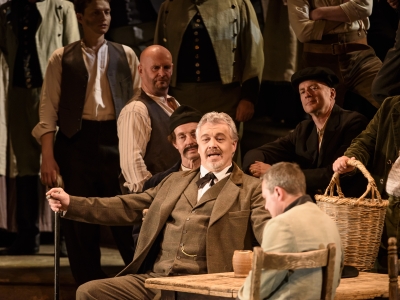

Cavalleria rusticana & Pagliacci Mascagni & Leoncavallo
Archived: 2015/2016Overview
This double bill is full-on and intense as Italian opera gets; each opera packing-in much high drama and powerful music – in just over an hour.
In Summer 2016, marking 70 years of WNO was a time to reflect. What better way to do this than with the double bill that started it all?
This perfect pairing of tragedies was our first performance in 1946. Cav & Pag (as they are affectionately known) are as full-on and intense as Italian opera gets. Each opera packs-in much high drama and powerful music in just over an hour.
Cavalleria rusticana’s highlights include the glorious Easter Hymn and Intermezzo. Pagliacci features one of the greatest of all tenor arias, ‘Vesti la giubba’, in which the clown Canio has just learnt that his wife is having an affair. He pitifully dwells on his situation while getting ready to take to the stage. He must act the fool on stage while dying inside.
The sumptuous period-set production features a recreation of a Sicilian village square. It is only fitting that the cast for these birthday performances includes some of Wales’s greatest opera talent.
Everyone who enjoys the elegance and pageantry of opera will want to embrace Cav & Pag.
Supported by the WNO Idloes Owen Society




Good to know
Sung in Italian with surtitles in English (and Welsh in Cardiff)
Cavalleria rusticana: Approx. one hour and 10 minutes
Pagliacci: Approx. one hour and 15 minutes
Synopsis
Cavalleria rusticana
Passions are running high in a Sicilian village on Easter Morning. Animal herder Alfio is inflamed with jealousy when he learns of his wife’s affair with the young gallant, Turiddu. The two men resort to a duel with knives, and, despite the protestations of Turridu’s mother and his heartbroken lover, Santuzza, the day ends in bloodshed.
Pagliacci
A touring troupe of actors arrives at a village in southern Italy, to perform their play, ‘The Clown and Columbine’, which tells the story of an unfaithful woman, played by real-life adulterer, Nedda. For Canio, her jealous husband in life and on stage, the irony is too much to bear, and the performance comes to a tragic end.



